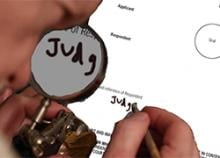
'Today I'm sitting your exam, tomorrow I'm taking your career hahaha!'
The Bar Standards Board has decided to ban all online exams because of suspected cheating in Pakistan and Bangladesh.
In April the BSB ordered Bar training providers who offered online exams in the two countries to suspend them with immediate effect after receiving allegations of ‘alleged malpractice’. Now it has made the ban permanent, and global.
Without specifying what its investigation uncovered, the BSB said that it had decided to prevent the use of online assessments platforms by Bar training providers “in any country” from August 2023.
“We have reflected further on the need to protect the integrity of the assessment. These are high stakes, professional exams that are the gateway to practice at the Bar and it is critical that the assessment process is secure and robust”, said the BSB in a statement.
“We have not taken this decision lightly, we understand the benefits of a more flexible approach to assessment delivery, nevertheless, we are taking this precautionary measure because we cannot compromise on the integrity of the exams”, it said.
Ahnaf Fahmin, a Barrister-At-Law at Lincoln’s Inn, alluded to a lackadaisical approach to invigilation in the countries which was notorious among students.
“More than 90% of the students from Bangladesh and Pakistan pursue their law degree from the University of London's external programme” he wrote in Bangladesh’s Daily Sun.
“I have witnessed and heard from many students and reliable sources how online exams were exploited by dishonest students”, he said.
Fahmin alleged that UoL originally conducted online assessments via remote proctoring with the advent of Covid in 2020 “but as the software crashed they changed their decision and asked the students to simply upload their answers like coursework”.
“This became a golden opportunity for the mischievous ones to exploit to the fullest. This went on until 2022”, he said.
Some students “paid barristers to sit the assessments for them in the absence of effective surveillance”, alleged Fahmin, who called it “disgraceful how some barristers breached their ethical duties... to commit academic misconduct”.
In response to the allegations, UoL told RollOnFriday that it "prides itself on delivering first class degree courses to more than 45,000 students around the world, which are assessed to the highest possible standards".
"Like the majority of higher education institutions, during the pandemic we shifted assessments from traditional in-person exams to online. This was to minimise disruption to our students and to ensure they could take assessments while travel restrictions and lockdowns were in place around the world", it said.
Preferring to remain silent on the specific accusations of cheating, the university said that it "implemented a number of measures, including remote proctoring, to maintain the integrity of the degrees awarded by the University of London during this time. All students are required to uphold certain standards for their assessments, which are designed to ensure fairness for all. We have robust measures in place for anyone who does not meet these standards".
The BSB told ROF it could not disclose whether it had gathered evidence of malpractice in any other countries because its investigation was "ongoing and confidential".
The optics of implying that Pakistan and Bangladesh alone were full of cheats had been flagged by critics. Advocating for a global ban in April, Fahmin said a localised prohibition gave the “wrong impression in the sense that mischief can exist among students of any place and if the root cause behind it is not addressed anyone can exploit online assessments from any place. The rule must be the same for all students”.
However, online assessments weren't just a battleground between invigilators tracking eyeball movement and cheats using surrogates: they also assisted disabled candidates, and news of the ban raised concerns that students who legitimately required the option could be disadvantaged.
Jacob Meagher, a disabled barrister and academic who runs an Equality Act consultancy, told RollOnFriday it was "a real step back in terms of advancing inclusivity in the profession“.
“They know they have disabled students who will need to sit exams online, and who have planned to do so”, he said, adding that “it seems that they have put this in the ‘too hard’ basket due to cheating in Pakistan, and due to chatGPT”.
A spokesperson for the BSB suggested to ROF that those fears were unfounded, stating that “the same range of reasonable adjustments that exist now will continue to be available to students who require them”.
Two years ago Kaplan's exams for foreign-qualified lawyers were beset by skullduggery, while six lawyers were caught out in Singapore last year. But that cheating was strictly analogue, whereas AI opens the door to a whole new world of possibilities. Someone should tell Gordon.
![]() Let top firms and companies ping your app when they like you for a role. Keep an ear to the ground with LawyerUp, available on the App Store or Google Play.
Let top firms and companies ping your app when they like you for a role. Keep an ear to the ground with LawyerUp, available on the App Store or Google Play.













Comments
32
33
Why should anyone pay a legal firm for services when they could use AI?
39
27
Sounds like a wise decision.
42
31
@ 10:53: because AI legal products are nowhere near ready for use by Joe Public, and someone still needs to interpret the law and subjective circumstances surrounding the client's issues. I've already enjoyed fixing three AI issues for clients who thought they could cut out the lawyers. Typical tech types.